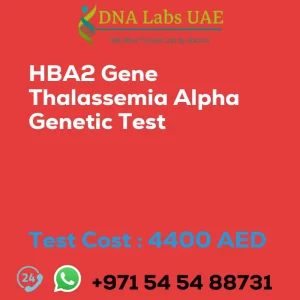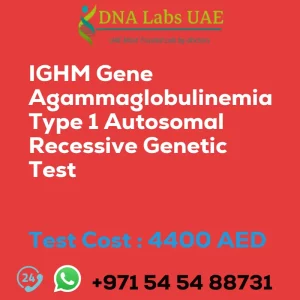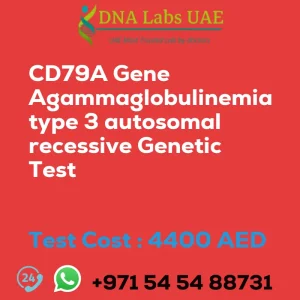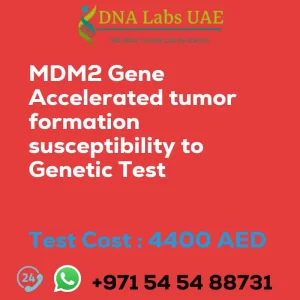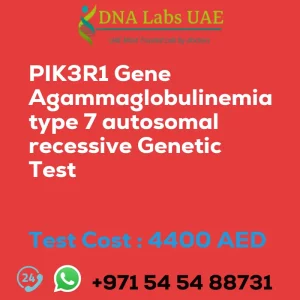WAS Gene Thrombocytopenia X-linked intermittent Genetic Test
At DNA Labs UAE, we offer the WAS Gene Thrombocytopenia X-linked intermittent Genetic Test at a cost of AED 4400.0.
Test Name: WAS Gene Thrombocytopenia X-linked intermittent Genetic Test
Components: Blood or Extracted DNA or One drop Blood on FTA Card
Report Delivery: 3 to 4 Weeks
Method: NGS Technology
Test type: Hematology
Doctor: Hematologist
Test Department: Genetics
Pre Test Information: Clinical History of Patient who is going for WAS Gene Thrombocytopenia, X-linked, intermittent NGS Genetic DNA Test. A Genetic Counselling session to draw a pedigree chart of family members affected with WAS Gene Thrombocytopenia, X-linked, intermittent NGS Genetic DNA Test gene WAS
Test Details:
WAS Gene Thrombocytopenia, X-linked, intermittent (WAS-XLT) is a rare genetic disorder that primarily affects males. It is caused by mutations in the Wiskott-Aldrich syndrome (WAS) gene, which is located on the X chromosome. The WAS gene provides instructions for producing a protein called WASp, which plays a crucial role in the functioning of immune cells and platelets. Mutations in this gene result in a deficiency or dysfunction of the WASp protein, leading to the symptoms associated with WAS-XLT.
The main features of WAS-XLT include intermittent episodes of thrombocytopenia (low platelet count), eczema (skin rash), and recurrent infections. Individuals with this condition may also experience easy bruising, bloody nose, and prolonged bleeding after injury or surgery. In severe cases, they may develop autoimmune disorders, malignancies, or have an increased risk of bleeding complications.
Next-generation sequencing (NGS) genetic testing is a diagnostic tool used to identify mutations in the WAS gene. This test involves analyzing the DNA sequence of the gene to detect any alterations or abnormalities. NGS allows for the simultaneous analysis of multiple genes, providing a more comprehensive assessment of genetic variants associated with WAS-XLT.
The NGS genetic test for WAS-XLT can help confirm a diagnosis, guide treatment decisions, and provide information about the inheritance pattern of the condition. It is typically performed on individuals suspected to have WAS-XLT based on their clinical symptoms and family history.
It is important to consult with a healthcare professional or a genetic counselor to understand the benefits, limitations, and implications of genetic testing for WAS-XLT. They can provide guidance on the appropriate testing approach and help interpret the results in the context of an individual’s specific situation.
| Test Name | WAS Gene Thrombocytopenia X-linked intermittent Genetic Test |
|---|---|
| Components | |
| Price | 4400.0 AED |
| Sample Condition | Blood or Extracted DNA or One drop Blood on FTA Card |
| Report Delivery | 3 to 4 Weeks |
| Method | NGS Technology |
| Test type | Hematology |
| Doctor | Hematologist |
| Test Department: | Genetics |
| Pre Test Information | Clinical History of Patient who is going for WAS Gene Thrombocytopenia, X-linked, intermittent NGS Genetic DNA Test. A Genetic Counselling session to draw a pedigree chart of family members affected with WAS Gene Thrombocytopenia, X-linked, intermittent NGS Genetic DNA Test gene WAS |
| Test Details | WAS Gene Thrombocytopenia, X-linked, intermittent (WAS-XLT) is a rare genetic disorder that primarily affects males. It is caused by mutations in the Wiskott-Aldrich syndrome (WAS) gene, which is located on the X chromosome. The WAS gene provides instructions for producing a protein called WASp, which plays a crucial role in the functioning of immune cells and platelets. Mutations in this gene result in a deficiency or dysfunction of the WASp protein, leading to the symptoms associated with WAS-XLT. The main features of WAS-XLT include intermittent episodes of thrombocytopenia (low platelet count), eczema (skin rash), and recurrent infections. Individuals with this condition may also experience easy bruising, bloody nose, and prolonged bleeding after injury or surgery. In severe cases, they may develop autoimmune disorders, malignancies, or have an increased risk of bleeding complications. Next-generation sequencing (NGS) genetic testing is a diagnostic tool used to identify mutations in the WAS gene. This test involves analyzing the DNA sequence of the gene to detect any alterations or abnormalities. NGS allows for the simultaneous analysis of multiple genes, providing a more comprehensive assessment of genetic variants associated with WAS-XLT. The NGS genetic test for WAS-XLT can help confirm a diagnosis, guide treatment decisions, and provide information about the inheritance pattern of the condition. It is typically performed on individuals suspected to have WAS-XLT based on their clinical symptoms and family history. It is important to consult with a healthcare professional or a genetic counselor to understand the benefits, limitations, and implications of genetic testing for WAS-XLT. They can provide guidance on the appropriate testing approach and help interpret the results in the context of an individual’s specific situation. |


